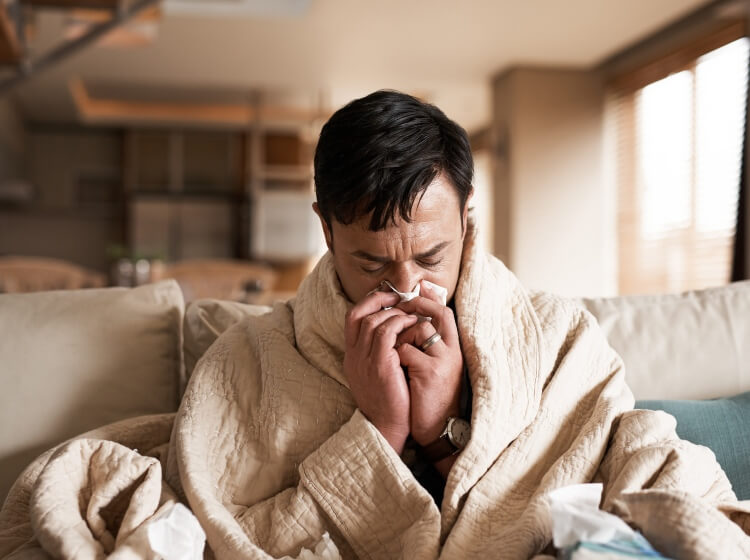Ways to Prepare for Cold and Flu Season
For the past two years, COVID-19 has dominated our thoughts and spurred us to protect ourselves from the virus. It’s important to remember, though, that this is not the only virus around, and it’s not even the only coronavirus! In fact, the common cold is a coronavirus, and what we call the flu is different strains of the influenza virus. Even in the midst of a pandemic, preparing for cold and flu season is still vital. Perhaps it’s even more crucial after all the time we’ve spent isolated from others, lulling our immune systems into a weakened state. How can you get ready for cold and flu season? We’ve got some simple tips to help you stay healthy and well.
- Good hygiene is one of the most important factors in staying well during cold and flu season. Wash your hands with soap frequently and use hand sanitizer that’s at least 60 percent alcohol when you can’t get to a sink. When you’re washing your hands, lather them for as long as it takes you to sing the “Happy Birthday” song twice. In addition to cleaning your hands, regularly clean common surfaces, especially in the kitchen and bathroom, using a cleaner with peroxide or bleach on hard surfaces to prevent the spread of viruses and bacteria. Wash toys, jackets, hats, and gloves regularly, and wipe down things like doorknobs, phones, and remote controls daily.
- Knowing the symptoms of the flu, the common cold and COVID-19 can help you stay vigilant about your health. Common cold symptoms are typically mild, with a runny nose, cough, congestion, and sore throat. The flu and COVID-19 have those symptoms as well as a fever or feverish feeling, chills, body or muscle aches, fatigue, headaches, and sometimes vomiting and diarrhea. COVID-19 sometimes comes with a loss of taste or smell, but not always. Because the symptoms of the flu and COVID-19 are similar, it’s important to get tested so that you’ll know for sure which illness you’re treating.
- Should you get a flu shot? Doctors recommend the influenza vaccine for a wide range of people, but there are some people who should not get the flu shot. These people include children who are younger than six months old, people who have severe, life-threatening allergies to ingredients in the flu vaccine, and people with egg allergies. If you’ve had Guillain-Barré Syndrome or you’re experiencing cold or flu symptoms, ask your doctor whether the flu shot is right for you. While you’re at it, talk to your doctor about the COVID-19 vaccine.
- Prepare for cold and flu season by stocking up on supplies. Get several bottles of hand sanitizer and put them everywhere- your house, your car, in purses, and in backpacks. Buy plenty of tissues, hand soap, and paper towels, and stock the medicine cabinet with pain relievers, decongestants, antihistamines, cough syrups, and fever reducers. Stock your pantry, too, with easy-to-prepare lunches and dinners as well as snacks and beverages. Have a working thermometer on hand and clean your humidifier so it will be ready to be of service when it’s needed. Make sure you’re familiar with your office policy for sick days, and put a support system in place to take your kids to places they need to go if you should become too sick to do it yourself. If you have kids, it’s also smart to stock up on puzzles, games, coloring books, and other quiet activities to keep them occupied during sick days.
- A big part of preventing colds and the flu is strengthening your immune system as much as possible. Eat a nutritious diet with plenty of immune-boosting nutrients like vitamin C, and stay hydrated, drinking plenty of water even if you’re not hot and thirsty. Get plenty of sleep, exercise regularly, and don’t smoke. If you do smoke currently, quit. Additional measures to prevent illness include steering clear of sick people and keeping your hands off of your face.
Sometimes, despite your best efforts, you’ll get a cold or the flu. When that happens, take care of yourself and stay home so that you can recover as quickly as possible. Staying home allows you to rest, and it also restricts the spread of your cold or flu virus to other people. You can treat cold symptoms with over-the-counter medications to alleviate discomfort but knowing how to treat the flu is a bit more complicated. Over-the-counter pain relievers can help, but you should also consider asking your doctor about an antiviral flu medicine to shorten the time you’re sick and make your symptoms less severe. No matter what kind of illness you’re experiencing, get plenty of rest and drink plenty of fluids like water, chicken soup, hot tea, or a beverage with electrolytes. If your symptoms persist or get worse, don’t hesitate to seek medical attention.
When you need to see a doctor, Brevard Health Alliance, Inc. can help. Brevard County’s only Federally Qualified Health Center, BHA offers extensive health care services on a sliding-fee scale so that we can treat residents regardless of their ability to pay. We’re committed to providing an extraordinary quality of care for our patients in order to improve the health status of Brevard County. Our focus is on continually improving the quality and efficiency of our care, and on ensuring that every patient we serve is heard, encouraged, and respected. As your family health care provider, we strive to provide not just acute care but also preventive care and healthcare-related education. Our board-certified physicians, advanced practice nurse practitioners, and physician assistants provide primary care that includes well-child checkups, well-woman care, and physicals, along with chronic disease management. In fact, since 2005 we’ve provided not only primary care services, but also behavioral health services, dental services, diagnostic services, resource management services, pharmacy services, women’s health care and obstetrics, Hepatitis C and HIV services, extended hours pediatric walk-in care, and specialty referrals. For more information, to find a location, or to make an appointment, contact us through our website.



















































































































































